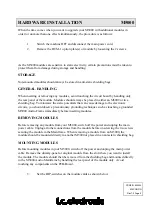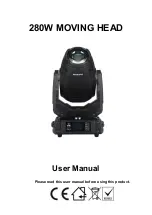
3-10
Dash 3000/4000 Patient Monitor
Revision A
2000966-339
Installation:
Optional Ethernet Communication
Twisted Pair Cabling (10BaseT)
Twisted pair is an IEEE 802.3 local area network that uses flat and
small diameter cable containing four pairs of twisted wires to connect
devices. Twisted pair operates at the same speed as thin-net and thick-
net (10 megabits/second), but the cable distances extended up to 100
meters (328 feet).
A twisted pair transceiver passes data back and forth between the
network device and the LAN. It is attached directly to the network device
at the at the 15-pin D-type connector. The twisted pair cable is connected
from the RJ-45 connector at the transceiver and the RJ-45 connector at
the concentrator.
NOTE
Some devices (like Octacomm/Solar 8000M patient monitor) have
10BaseT standard, meaning that the RJ-45 connector is part of the
product and the twisted pair transceiver is not required.
Symbol PC Card (Wireless LAN)
The Symbol PC card, installed in the monitor, uses a 2.4 GHz frequency
band and a Frequency Hopping spread spectrum (FHSS). The Frequency
Hopping spread spectrum meets IEEE 802.11 standards.
Two diversity antennas, installed in the handle of the monitor, radiates
the RF energy through the air to a Symbol Access Point. The Symbol
Access Point also uses a 2.4 GHz frequency band and the Frequency
Hopping spread spectrum.
NOTE
Refer to the Wireless LAN (Symbol Access Point) Installation and
Service Manual for detailed information on the Symbol Access point.
NOTE
The following is required for the monitor to roam from access point to
access point while maintaining Wireless LAN communication with
the Unity Network.
Installation of the RF LAN (Wireless LAN) option.
Configuration and verification of the monitor’s RF LAN
operation.
Activation of the RF LAN by disconnecting the monitor’s
Ethernet cable.
Summary of Contents for Dash 3000
Page 1: ...Dash 3000 4000 Patient Monitor Service Manual 2023896 023 Revision A ...
Page 11: ...Revision A Dash 3000 4000 Patient Monitor 1 1 2000966 339 1 Introduction ...
Page 12: ...1 2 Dash 3000 4000 Patient Monitor Revision A 2000966 339 For your notes ...
Page 19: ...Revision A Dash 3000 4000 Patient Monitor 2 1 2000966 339 2 Equipment Overview ...
Page 20: ...2 2 Dash 3000 4000 Patient Monitor Revision A 2000966 339 For your notes ...
Page 45: ...Revision A Dash 3000 4000 Patient Monitor 3 1 2000966 339 3 Installation ...
Page 46: ...3 2 Dash 3000 4000 Patient Monitor Revision A 2000966 339 For your notes ...
Page 55: ...Revision A Dash 3000 4000 Patient Monitor 4 1 2000966 339 4 Maintenance ...
Page 56: ...4 2 Dash 3000 4000 Patient Monitor Revision A 2000966 339 For your notes ...
Page 117: ...Revision A Dash 3000 4000 Patient Monitor 5 1 2000966 339 5 Troubleshooting ...
Page 118: ...5 2 Dash 3000 4000 Patient Monitor Revision A 2000966 339 For your notes ...
Page 149: ...Revision A Dash 3000 4000 Patient Monitor 6 1 2000966 339 6 Configuration ...
Page 150: ...6 2 Dash 3000 4000 Patient Monitor Revision A 2000966 339 For your notes ...
Page 173: ...Revision A Dash 3000 4000 Patient Monitor 7 1 2000966 339 7 Calibration ...
Page 174: ...7 2 Dash 3000 4000 Patient Monitor Revision A 2000966 339 For your notes ...
Page 182: ...8 2 Dash 3000 4000 Patient Monitor Revision A 2000966 339 For your notes ...
Page 226: ...9 2 Dash 3000 4000 Patient Monitor Revision A 2000966 339 For your notes ...
Page 280: ...A 2 Dash 3000 4000 Patient Monitor Revision A 2000966 339 For your notes ...
Page 291: ......
















































